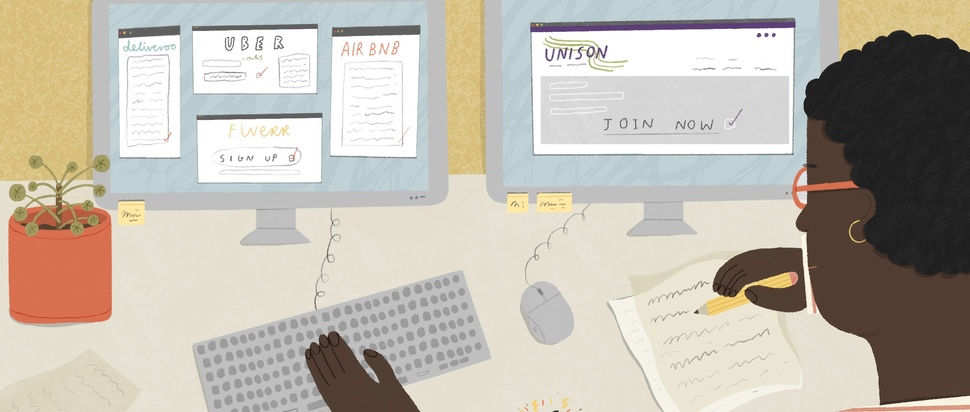Power in a Union: Eve Livingston on Make Bosses Pay
Political journalist and author Eve Livingston on her union manifesto, Make Bosses Pay
What do you think of when you think of a union? Do you imagine an imposing building, or a cramped office filled with pamphlets and protest signs? Do you imagine a picket lined with miners and beleaguered industrial workers, à la Billy Elliot and Pride? Do you imagine an organisation that is still politically relevant, or one consigned to the austerity politics of the Thatcher era? Do you ever, in your imaginings, picture yourself?
For Eve Livingston, political journalist and author of the searing union primer Make Bosses Pay: Why We Need Unions, the first step towards addressing our economic crisis and broken working culture is understanding what, or more precisely who, a union is. “I think there's a perception among many young workers that a union is a service provider: something external to you that you join and then they give you things, like legal advice or discounts on computers or restaurants,” Livingston explains. “In my book, I implore people to think of the union as yourself and your co-workers. There is no union without members. It is a dynamic, living, breathing thing.”
This gap – between the perception of unions in the public consciousness and their reality – forms the central concern of Makes Bosses Pay, a forensic manifesto for unionism that advocates not just for what unions could be, but what they already are. Taking a markedly broad approach through the history of the British labour rights movement to the contemporary concerns of the gig economy, Livingston draws on diverse case studies to underline the ever-present exploitation of workers within mounting capitalist systems, and the urgency of imagining the union beyond a now outdated model of white, male breadwinners.
“The mainstream public imagination started to take precarious work seriously around the explosion of app-based businesses like Deliveroo and Uber,” Livingston says. “And a lot of workers in these businesses are male: when they think of a Deliveroo driver, people tend to think of a young male student on a bike. But that's not the reality. The issues of the gig economy – precarious working contracts and being at the whim of your boss every hour of the day – those things aren't new, and they're particularly not new to women and migrants.”
Crucially, Livingston adds, this model of insecure work is set up to isolate workers from each other and undermine any possibility of collective power. “There is a deliberate political benefit to precarious work for bosses,” she stresses. “When you employ all your workforce on zero hours contracts and have an overabundance of workers and under-provision of shifts, you create an atmosphere of competitiveness. Workers have no incentive to unionise and be a collective because they're in competition with each other for shifts and pay.”
In an increasingly atomised workforce beset on all sides by insecure contracts, cuts to the welfare state, and frightening advances in surveillance technology, unions are having to adapt just as drastically. “If you’re working in a precarious sector and waiting for your boss to call at any given moment, then traditional union wins like the weekend don't really apply anymore,” Livingston points out. “There is a need for us to think about unions in the broadest sense, utilising that structure wherever we can”.
The most exciting developments in workers’ rights, Make Bosses Pay argues, are the new generation of unions taking a fundamentally expansive approach to how workers and working practices are defined. Sex worker collectives such as SWARM (Sex Worker Advocacy and Resistance Movement) and SWU (Sex Workers’ Union) campaign to have their members recognised as workers, and thus have access to industrial rights and collective representation. Community unions such as ACORN (Association for Community Organisations for Reform Now) and Living Rent (Scotland’s tenants union), meanwhile, work – as Livingston puts it – to “leverage the union structure in different contexts and organise people as citizens and tenants rather than workers”, understanding class struggle within broader issues such as housing and benefits.
Much less relics of the past, Livingston fervently believes, unions are where the future of radical politics lie and can become a home for a politicised generation left behind by right-wing governments and an increasingly centrist opposition. “There is a young left that mobilised behind electoral figures like Bernie Sanders and Jeremy Corbyn,” she says. “And I make the case early on in the book that unions are the place where that energy should go now. Something that survives electoral cycles and doesn't collapse and have to be rebuilt every four or five years. Our own institution that we are building as the working class.” It may sound, in many ways, like a political utopia. But – as Make Bosses Pay makes abundantly clear – it already exists, right within the grasp of workers everywhere.
Make Bosses Pay: Why We Need Unions is available from Pluto Press
